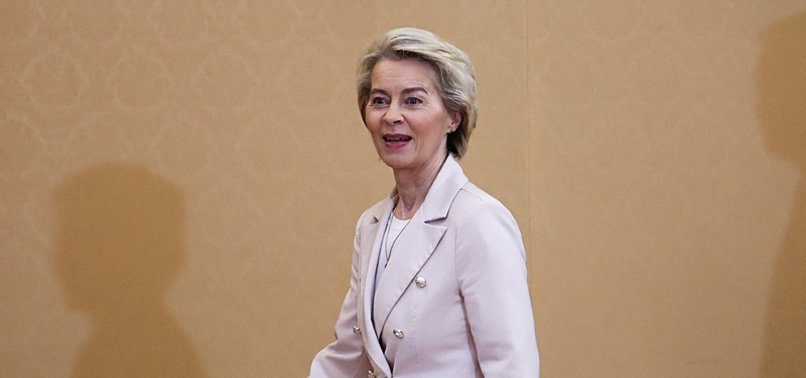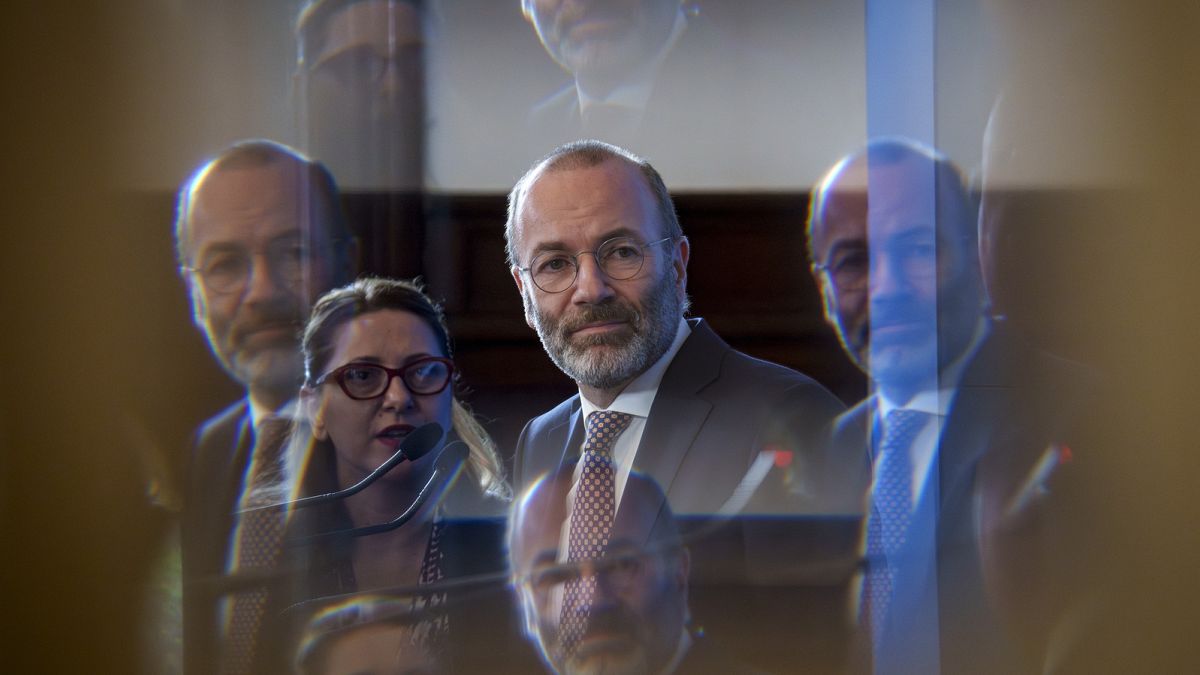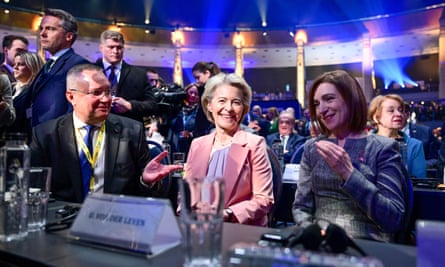But in a deliberately timed letter, the French delegation of the EPP from the Les Républicains ("The Republicans") party, published a scathing letter blasting von der Leyen's policy legacy and leaving no doubt of their opposition to her re-election.
The document outlines a raft of proposed economic, social and institutional reforms. But at the core of the group’s election bid are three defining issues: migration, climate and defence.
Among the plans floated are the controversial outsourcing of asylum applications to third countries based on the UK-devised ‘Rwanda model’, more financial support for farmers and fishers to adapt to the climate transition, and a dedicated EU defence budget.
The EPP, which harbours Europe’s Christian-democratic, liberal and conservative parties, is set to remain the European Parliament’s biggest faction after June’s vote, with its lead candidate Ursula von der Leyen a firm favourite to be re-elected European Commission president.
But the group is also under increasing scrutiny as it aims to claw back the political ground it is quickly losing to far-right challengers due to the deepening economic downturn and disenchantment with the political elite.
Speculation is now rife that the EPP, which has formed a ‘grand coalition’ with centrist groups in the European Parliament for decades, could instead build bridges with far-right or Eurosceptic counterparts as voters swing to the right.
Euronews breaks down the core tenets of the group’s manifesto.
Migration is a pervasive topic in the manifesto, mentioned a total of 18 times. The EPP pitches itself a pragmatic centre-ground, accusing the extreme right of refusing to “engage constructively” and the left of “reluctance” to reduce irregular migration.
The EPP has recently been accused of a backlash against the European Green Deal, a landmark set of laws to curb rising global temperatures. A cohort of EPP lawmakers came under fire in 2023 for orchestrating a campaign to block the Nature Restoration Law, an EU bill to restore at least 20% of land and sea ecosystems by 2030.
But the group is vowing to open the Green Deal’s “next phase” by
- prioritising technology ‘made in Europe’ to boost competitiveness vis-à-vis the US and China,
- and give farmers, fishers and SMEs more financial support to adapt to the transition.
A previously leaked draft of the EPP manifesto proposed revising the EU’s ban on the sale of new CO2-emitting cars from 2035. But the idea has been excluded in last-minute redrafts, with the final text specifying “engineers, not politicians, together with the market should be deciding on the best technology in order to achieve carbon neutrality.”
Signs the EPP could abandon key environmental policies risked creating friction with von der Leyen herself, who crafted the Green Deal, describing it as Europe’s “man on the moon moment” in 2019. The final manifesto text aims to tread a tightrope by vowing to tackle climate action whilst ensuring economic security.
But von der Leyen has also been criticised for giving in to political pressure and abandoning the progressive Green Deal she championed.
- A wave of mass protests amongst farmers in recent months prompted von der Leyen's Commission to hastily review a law aimed at reducing the use of pesticides.
- It has also introduced measures to shield farmers from cheap Ukrainian imports and to allow them to use land they had previously been required to keep fallow for environmental reasons.
- Von der Leyen’s claim that the wolf is a “real danger” to livestock and human life has been blasted as overblown, misled and personally motivated. Von Der Leyen’s own pony, Dolly, was killed by a male wolf in north-eastern Germany in 2022.
“A Europe that can defend itself”
Von Der Leyen has vowed to make defence a centrepiece of her second mandate, in a bid to undo the impacts of decades of defence cuts as war returns to European soil.
- a European Commissioner dedicated to security and defence,
- a mandate on member states to prioritise European purchases of military equipment, and
- new restrictions on arms exports.
- It also calls for a dedicated EU defence pot of money within the bloc’s long-term budget, the Multi-Annual Financial Framework.
- These measures should eventually lead to a “Single Market for Defence”, the EPP says.
The EU defence industry, which is largely structured along national lines, has been criticised for its sluggish provision of ammunition to Ukraine’s armed forces, with supply shortages leading to recent losses on the frontline.
The prospect of joint debt issuance or defence bonds, which fiscally conservative countries are likely to see as an encroachment on national competence, does not feature in the manifesto.
The text also floats French President Emmanuel Macron’s proposal for a European nuclear deterrent.
Decisions on the EU single market for defence - as well as on sanctions against “totalitarian regimes around the world” should no longer require the unanimous blessing of all EU leaders, the manifesto also says.
Critical EU foreign policy decisions, including on financial support to Ukraine, have in recent months been scuppered due to the veto power of Hungarian Prime Minister Viktor Orbán. With the bloc looking to integrate new members - including Ukraine - in the next years, there is broad consensus that the unanimity vote should be replaced by qualified majority voting to avoid leaders from single-handedly derailing majority-backed solutions.
Eurostat's preliminary estimate, issued on 1 March, demonstrates that annual inflation in the eurozone area fell to 2.6% in February, down from 2.8% in January. However, it is still above the European Central Bank's (ECB) target inflation rate of 2%.
The inflation rate, measured by the Harmonised Index of Consumer Prices (HICP), largely differs across Europe. While it has been seen to cool in most of the EU countries, none of them showed a negative inflation figure in January year-on-year. The Eurostat's estimates for February do not show any sign for such a decline in any country yet.
How do inflation rates in the EU compare and how has the annual inflation changed since its peak?
Inflation hit its highest rate in the past four decades in October 2022.
The COVID-19 crisis was followed by a significant surge in consumer prices as the Organisation for Economic Co-operation and Development's (OECD) report of 2023 showed. Prices began to rise in 2021 because of the rapid rebound from the pandemic and related supply chain bottlenecks.
Russia's invasion of Ukraine also pushed inflation upwards again with its impact on energy prices bringing it, in October 2022, to levels not seen for 40 years.
Between 1997 and the end of 2021, the EU's highest annual inflation rate of 4.4%was recorded in July 2008.
Since that peak, the annual inflation rate in both the EU and eurozone area fell every month, with the exception of one month for each section.
Romania has the highest inflation
January 2024's figures show, the annual inflation ranged from 0.9% to 7.3% in the EU. Romania came in with the highest rate 7.3% among the EU members, followed by Estonia (5%), Croatia (4.8%) and Poland (4.5%).
Lowest inflation in Denmark and Italy
Denmark and Italy recorded the lowest annual inflation rates at 0.9%. Latvia, Lithuania and Finland followed them at 1.1%.









No comments:
Post a Comment